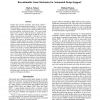Free Online Productivity Tools
i2Speak
i2Symbol
i2OCR
iTex2Img
iWeb2Print
iWeb2Shot
i2Type
iPdf2Split
iPdf2Merge
i2Bopomofo
i2Arabic
i2Style
i2Image
i2PDF
iLatex2Rtf
Sci2ools
AIIDE
2008
2008
Recombinable Game Mechanics for Automated Design Support
Systems that provide automated game-design support-whether fully automated game generators, or tools to assist human designers--must be able to maintain a representation of a game design and add or remove game mechanics to support incrementally modifying the game. The system should then be able to reason about the design to support the designer. For example, it might point out that the set of mechanics makes the game unwinnable; or that there's only one complex possible way to beat the game; or that some room is impossible to get to. In addition, the same representation should be actually playable as a game. Existing game representations encode a fairly narrow range of games, most commonly symmetric board games; these representations are also difficult to extend or revise. We propose an architecture based on the event calculus, a logical representation designed for reasoning about time in an elaboration-tolerant way, meaning that designs can be changed by adding or removing sets ...
| Added | 02 Oct 2010 |
| Updated | 02 Oct 2010 |
| Type | Conference |
| Year | 2008 |
| Where | AIIDE |
| Authors | Mark J. Nelson, Michael Mateas |
Comments (0)

